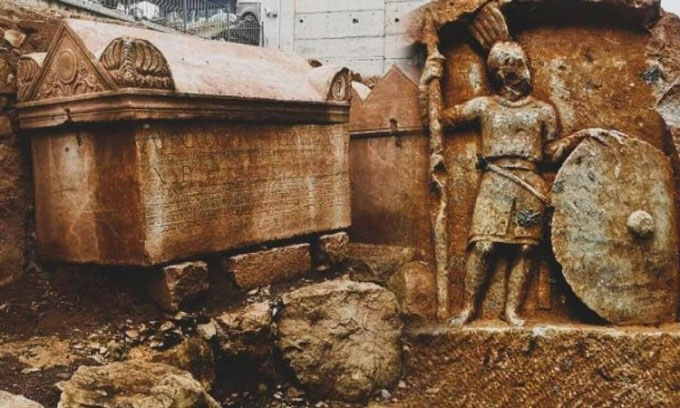The stone coffin containing the intact remains of a guard who once protected Roman Emperor Diocletian, along with various burial artifacts.

The stone coffin of Tziampo. (Photo: Arkeonews)
Archaeologists discovered a coffin engraved with the phrase “the protector of the emperor” in Latin in Kocaeli Province, western Turkey, during the foundation construction of a building from 2017 to 2019. Throughout the excavation led by the Kocaeli Museum, the research team identified a total of 37 graves. The coffin was found in one of these graves. Research conducted by Associate Professor Hüseyin Sami Öztürk at Marmara University confirmed that the coffin belonged to Tziampo, a guard of Emperor Diocletian (reigned from 284 – 305).
According to Serkan Geduk, director of the Kocaeli Archaeological and Ethnographic Museum, Tziampo was originally from Romania before joining the Roman army as a cavalryman. He was trained to disrupt enemy infantry formations, attack from the flank, chase down, capture, and kill fleeing enemies. After nine years on the front lines, Tziampo was promoted to the rank of general, and in his eleventh year of service, he was granted the title of “the protector of the emperor.”
Archaeologists noted that Tziampo was part of an eight-man guard team, with the other seven members hailing from Italy, Croatia, Serbia, Algeria, and Arabia. Tziampo’s grave is particularly significant as it marks the first time a guard of the emperor has been discovered in Anatolia (now Turkey), and his skeleton remains intact, surrounded by numerous burial artifacts. The research team unearthed many ritual offerings around the two skeletons, with the other skeleton belonging to Tziampo’s wife.
In addition to Tziampo’s coffin, four of the five other coffins discovered in the area also featured inscriptions in Latin. All the remains and burial artifacts collected from the grave site in Kocaeli will help researchers gain a deeper understanding of Anatolia’s history under Roman rule.


















































